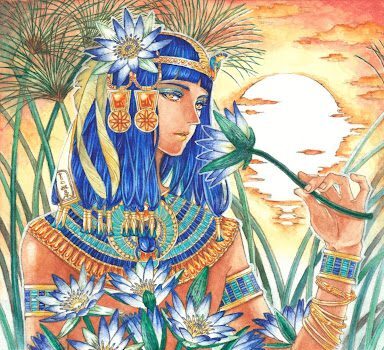Among the many botanical treasures of the ancient world, few have captured the imagination like Egyptian Blue Lotus Tea. Revered for its beauty, medicinal properties, and spiritual significance, the blue lotus flower (scientifically known as Nymphaea caerulea) was more than just a plant in ancient Egypt—it was a symbol of rebirth, a key ingredient in ritual ceremonies, and a gentle herbal relaxant still used today.
This article explores the origins, preparation, benefits, and cultural relevance of Egyptian blue lotus tea, offering a deep dive into why this ancient brew continues to charm the modern world.
What Is Egyptian Blue Lotus Tea?
Egyptian Blue Lotus Tea is a herbal infusion made from the dried petals or buds of the Nymphaea caerulea flower, commonly known as the blue lotus. Despite being called a lotus, it’s actually a type of water lily that grows naturally in the Nile River and other parts of East Africa.
The tea is known for its slightly sweet, floral flavor and calming effects. Traditionally steeped in hot water, it has been used for thousands of years for both its psychoactive and medicinal properties.
Historical Significance of Blue Lotus in Ancient Egypt
A Sacred Flower of the Nile
In ancient Egypt, blue lotus held divine symbolism. It was frequently associated with the sun god Ra and the concepts of creation and rebirth. Since the flower blooms in the morning and closes at night, Egyptians viewed it as a symbol of the sun’s daily cycle and the concept of eternal life.
Ritual and Religious Use
The blue lotus was not just admired for its beauty—it played a central role in spiritual and religious ceremonies. Pharaohs and priests used blue lotus in rituals to induce a meditative or trance-like state. Archaeological evidence shows depictions of people inhaling the fragrance of blue lotus or steeping it in wine to amplify its effects.
In fact, blue lotus flowers have been found in the tomb of King Tutankhamun, suggesting its importance in burial rites and the afterlife.
Botanical Characteristics of the Blue Lotus
Though often confused with the Indian lotus (Nelumbo nucifera), the blue lotus is a distinct species. It features sky-blue to violet petals and a bright yellow center. It grows in shallow waters and has been cultivated for ornamental, spiritual, and medicinal purposes for centuries.
Here are some botanical details:
- Scientific name: Nymphaea caerulea
- Family: Nymphaeaceae (water lily family)
- Habitat: Native to Egypt and parts of East Africa
- Flowering season: Summer (typically from June to September)
How Egyptian Blue Lotus Tea Is Made
Making Egyptian blue lotus tea is a simple yet soothing ritual. The dried petals or buds are typically steeped in hot water, similar to most herbal teas. Here’s how it’s traditionally prepared:
Ingredients:
- 1–2 teaspoons of dried blue lotus petals or one whole dried bud
- 1 cup (250 ml) hot water (not boiling—ideally around 85–90°C or 185°F)
- Optional: honey or lemon for added flavor
Instructions:
- Place the petals or bud in a tea strainer or teapot.
- Pour hot water over the flower.
- Cover and steep for 5–10 minutes.
- Strain and enjoy.
The resulting tea has a mild floral taste with subtle notes of earthiness and sweetness. Some prefer steeping the flower in wine for a few hours—a practice dating back to ancient Egypt—to enhance its relaxing and mildly euphoric effects.
Health Benefits of Blue Lotus Tea
Modern users continue to explore the many potential benefits of blue lotus, most of which align with ancient uses. Though more scientific research is needed, anecdotal evidence and traditional medicine suggest the following effects:
1. Natural Stress Relief
The most popular benefit of Egyptian blue lotus tea is its calming effect on the nervous system. It may help reduce anxiety, promote relaxation, and support emotional balance.
2. Mild Sedative Properties
Blue lotus contains aporphine and nuciferine—natural compounds known for their sedative effects. These alkaloids may induce a light sense of euphoria or drowsiness, making the tea popular among those dealing with insomnia or restlessness.
3. Aphrodisiac Effects
Historically, blue lotus was considered an aphrodisiac. Ancient texts and art suggest it was used to enhance intimacy, and some modern users report increased sensual awareness after drinking the tea or using the extract.
4. Antioxidant Support
Blue lotus is rich in antioxidants, which may help neutralize free radicals, reduce inflammation, and support overall cellular health. This adds another layer of benefit for regular users seeking natural wellness support.
5. Digestive and Pain Relief
Traditional healers also used blue lotus for digestive discomfort, menstrual cramps, and mild pain. While evidence is mostly anecdotal, some users claim the tea soothes stomach issues and muscle tension.
Is Blue Lotus Tea Legal and Safe?
In most countries, Egyptian blue lotus tea is legal and sold as an herbal supplement or tea. However, it’s important to note:
- It is not approved by the FDA for medical use.
- In some regions (like parts of the U.S. or UK), blue lotus extracts may be restricted in concentrated form, especially when sold for psychoactive purposes.
As with any herb, moderation is key. The tea is generally considered safe for adults, but it should not be used by pregnant or breastfeeding women, or those on sedatives, antidepressants, or blood pressure medications without consulting a healthcare provider.
Modern-Day Uses and Popularity
In today’s world, blue lotus has found a niche among herbal tea lovers, spiritual practitioners, and holistic wellness communities. It’s often used in:
- Herbal tea blends
- Meditation rituals
- Yoga and sound healing sessions
- Aromatherapy and baths
- Herbal-infused wine or elixirs
Online shops, wellness cafes, and herbal markets around the world now stock Egyptian blue lotus tea, often advertising its “ancient magic” and calming properties.
Final Thoughts: The Legacy of Egyptian Blue Lotus Tea
From the sacred temples of the Nile to modern herbal apothecaries, Egyptian blue lotus tea continues to enchant and heal. It’s a symbol of serenity, mystery, and ancient wisdom—a rare botanical gem that bridges history and holistic wellness.
Whether you’re sipping it for stress relief, deeper meditation, or simply to connect with ancient traditions, blue lotus offers a timeless invitation to pause, reflect, and renew.































